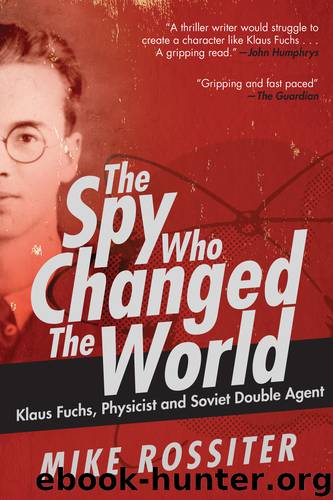The Spy Who Changed the World by Mike Rossiter

Author:Mike Rossiter
Language: eng
Format: epub, mobi
ISBN: eBook ISBN: 9781510726758
Publisher: Skyhorse Publishing
Published: 2017-11-16T05:00:00+00:00
FIFTEEN
Pillar of the Establishment
Despite Michael Serpell’s dismissal of him as a “refugee scientist”, Fuchs was now a senior figure in the British nuclear establishment. As an unmarried German émigré it was unlikely that he would be offered one of the top executive posts, which would always be reserved for the more clubbable products of the old school tie, but his job in charge of the Theoretical Division at Harwell was prestigious and a mark of the regard that senior scientists like Chadwick and Cockcroft had for him.
Fuchs could talk as an equal to the most eminent physicists in the Western world. He remained a good friend of Max Born; Edward Teller invited him to dinner when he was in the United States; Hans Bethe at Cornell University entertained him on his way from Los Alamos to Britain; and Robert Oppenheimer suggested that Fuchs take a rest from his busy schedule and spend some time at the Institute of Advanced Study in Princeton.
While Fuchs was riding high, the British nuclear programme, both civil and military, was off to a very shaky start. In the planning stages since the completion of the MAUD Report in 1942 the British government had always baulked at the cost of setting up and running its own factories and research establishments. Now, six years later, the costs of Britain going it alone had not diminished and the economy was, if anything, in a worse state. Victory in the war had brought the expense of feeding and housing millions of homeless and unemployed Germans in their own country, while the situation at home was little better. Rationing was still in force, hundreds of thousands of homes had been reduced to rubble by the Blitz and the V1 and V2 rocket attacks on London, and the government had run up massive overseas debts. Bread rationing had been introduced in 1946—something that had never seemed necessary even in wartime—and it was to last for two years.
In 1945 the new Labour government under Prime Minister Clement Attlee had taken the decision to set up Harwell, but when the McMahon Act was passed in the United States in 1946, Britain really had to go it alone. This piece of US legislation—passed rapidly in the wake of the Gouzenko defection and revelation about Allan Nunn May—stated that all research about nuclear energy, no matter how it was obtained, was secret unless it was specifically declassified. This automatically prohibited the transfer of information to Britain, even if, for example, British scientists working on the Manhattan Project had developed that information. If Britain was to have an independent atomic weapon, then the complete building programme originally called for in the MAUD Report could no longer be postponed.
An important development that had taken place in the last six years was the discovery of plutonium by Glenn Seaborg at the University of California in Berkeley. Plutonium, as we have seen, was produced from the uranium in a nuclear reactor, and this new element could be used as the critical core of an atomic bomb.
Download
The Spy Who Changed the World by Mike Rossiter.mobi
This site does not store any files on its server. We only index and link to content provided by other sites. Please contact the content providers to delete copyright contents if any and email us, we'll remove relevant links or contents immediately.
| Anthropology | Archaeology |
| Philosophy | Politics & Government |
| Social Sciences | Sociology |
| Women's Studies |
The Secret History by Donna Tartt(19047)
The Social Justice Warrior Handbook by Lisa De Pasquale(12186)
Thirteen Reasons Why by Jay Asher(8892)
This Is How You Lose Her by Junot Diaz(6875)
Weapons of Math Destruction by Cathy O'Neil(6264)
Zero to One by Peter Thiel(5786)
Beartown by Fredrik Backman(5737)
The Myth of the Strong Leader by Archie Brown(5496)
The Fire Next Time by James Baldwin(5431)
How Democracies Die by Steven Levitsky & Daniel Ziblatt(5213)
Promise Me, Dad by Joe Biden(5141)
Stone's Rules by Roger Stone(5080)
A Higher Loyalty: Truth, Lies, and Leadership by James Comey(4950)
100 Deadly Skills by Clint Emerson(4919)
Rise and Kill First by Ronen Bergman(4778)
Secrecy World by Jake Bernstein(4740)
The David Icke Guide to the Global Conspiracy (and how to end it) by David Icke(4699)
The Farm by Tom Rob Smith(4502)
The Doomsday Machine by Daniel Ellsberg(4484)
